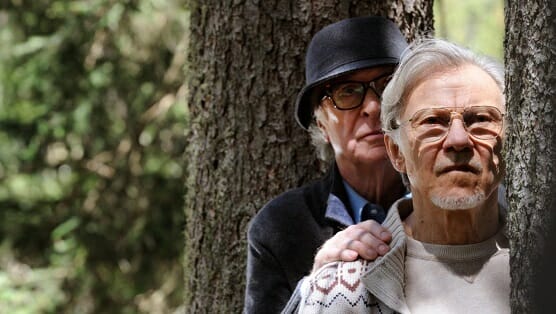Youth (2015 Cannes review)

Perhaps there is nothing new to be said about the challenges of making art, the difficulties of growing older, and the regrets that eat away at our lives. But while it would be inaccurate to say that filmmaker Paolo Sorrentino has found fresh insights into these familiar cinematic themes, Youth goes a long way on the enthusiasm he has to try. The umpteenth story about an aging artist wondering what it all means, this sensuous drama soars as high as Sorrentino’s dance of images and sounds can carry it. And Youth soars plenty—even if you know the terrain well.
Michael Caine stars as Fred Ballinger, a retired composer and conductor who’s vacationing in the Alps at an exclusive hotel. Not quite melancholy but also not exactly invested in doing anything, Ballinger is approached by an emissary from the Queen of England, who would like him to give a special performance in London of his most beloved composition. He politely declines, citing unspecified personal reasons.
Youth doesn’t spend much time on the queen’s request, nor does Sorrentino structure the entire narrative around what those “personal reasons” are. But they’re part of the tapestry of this film, which tends to float from incident to incident, with plenty of random musings in between. Ballinger’s close friend Mick Boyle (Harvey Keitel), a movie director, is also vacationing in the hotel, and he’s laboring away on a script he hopes will be his artistic testament. The only problem is that he can’t hit upon how to write the ending, which is a deathbed scene. He can’t write it, of course, because he’s not sure how to sum up his own life.
Since his 2008 international breakthrough Il Divo, Sorrentino has made his name as a bold visual stylist, weaving together dreamy, colorful images and expressive, startling music. It’s not just because he’s Italian that he gets compared to Fellini: Both filmmakers get drunk on film’s transportive, carnival-like quality. His 2013 movie The Great Beauty won the Best Foreign Language Film Oscar, and Youth can be seen as a continuation of that film’s operatic, powerfully wistful tone and its study of older men taking the measure of their lives.
The entire film is set in and around Ballinger’s fabulously elegant hotel—it could be The Grand Budapest Hotel’s Gustave’s idea of heaven—and other characters wander into the story. A respected actor’s actor (Paul Dano) is doing intense prep for a secret role, while Ballinger’s daughter Lena (Rachel Weisz), who works as her dad’s assistant, has arrived heartbroken after learning that her husband (Boyle’s son) has fallen in love with someone else. The characters get massages, walk the grounds and attend nighttime events put on by the hotel. Mostly, they talk: The hotel could be viewed as a sort of way station for these individuals, who are all working through mini-crises. Nothing in Youth is that urgent, and Sorrentino encourages a lighthearted approach, although the underlying issues—love, death, the meaning of life—are all rather substantial.
-

-

-

-

-

-

-

-

-

-

-

-

-

-

-

-

-

-

-

-

-

-

-

-

-

-

-

-

-

-

-

-

-

-

-

-

-

-

-

-








































